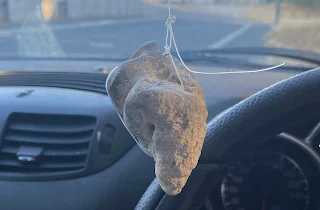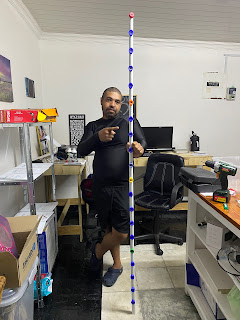Beachgoer's Unexpected Rescue Mission: Exposing the Shocking Truth Behind Fishing Pollution!
This was the scene I encountered recently at Strandfontein Pavilion, nestled on the southern peninsula of Cape Town, South Africa. What began as a leisurely seaside excursion swiftly transformed into a mission to aid a distressed kelp gull. With a hook embedded in its mouth and fishing line ensnared around its beak, immediate action was imperative.
Responding to the urgency of the situation, I sprang into action. Despite lacking specialized bird rescue equipment, I carefully navigated the situation, prioritising the bird's safety. Keeping in mind the risk of exacerbating its injuries, I opted to carefully cut away the excess fishing line tangled around the gull's beak, leaving the hook intact. Remarkably, the line was tied to a rock at the other end, revealing the makeshift nature of the angling setup that had caused the entanglement.
I made the decision to transport the injured gull to the South African Foundation for the Conservation of Coastal Birds (SANCCOB), where qualified seabird veterinarians could provide the necessary care. It was a heart-wrenching moment, knowing that the bird's fate hung in the balance, but also a hopeful one, knowing that it was now in the hands of professionals equipped to help.
As I reflect on this experience, I am reminded of the broader issue at hand—the prevalence of discarded angling gear littering our coastal environments and posing a grave threat to marine life. The stretch of beach extending from Strandfontein Pavilion along the southern peninsula is a popular spot for recreational anglers, drawn by the promise of plentiful catches in the surrounding waters. However, amidst the natural beauty of this coastal haven lies a darker reality—tangled fishing lines, rusted hooks, and abandoned lures strewn across the sand, silently bearing witness to the consequences of careless angling practices.
This incident also highlights the interconnectedness of our coastal ecosystems. Nearby Simon's Town, home to a nesting colony of African Penguins, serves as a poignant reminder of the broader impact of our actions. These charismatic seabirds rely on the rich marine resources of the surrounding waters to sustain themselves and their offspring. However, the presence of discarded fishing gear poses a significant risk to their well-being as they forage for food.
It is clear that we must take collective responsibility for our actions and prioritise the protection of our precious coastal ecosystems. Whether you're an avid angler or simply enjoy a day at the beach, there are steps we can all take to minimise our impact on marine life.
Proper disposal of angling gear and litter is paramount. Investing in reusable or biodegradable fishing equipment can significantly reduce the risk of entanglement for wildlife. Participating in beach clean-up initiatives and spreading awareness about responsible angling practices are also crucial steps towards fostering a more sustainable coastal environment.
Together, we can work towards ensuring that future generations can enjoy the splendour of our oceans without the looming threat of discarded fishing gear. Let us unite in our efforts to promote responsible angling and safeguard the welfare of all inhabitants of our coastlines.
Despite the valiant efforts to save the injured seagull, tragically, it succumbed to its injuries at the rehabilitation centre. The suspected cause of death was septicaemia, highlighting the severity of the injuries sustained from the entanglement with fishing debris. This outcome underscores the urgent need for greater awareness and action to address the issue of fishing pollution in our coastal waters. As we reflect on this loss, let us recommit ourselves to protecting our marine ecosystems and the wildlife that inhabit them.





Comments
Post a Comment